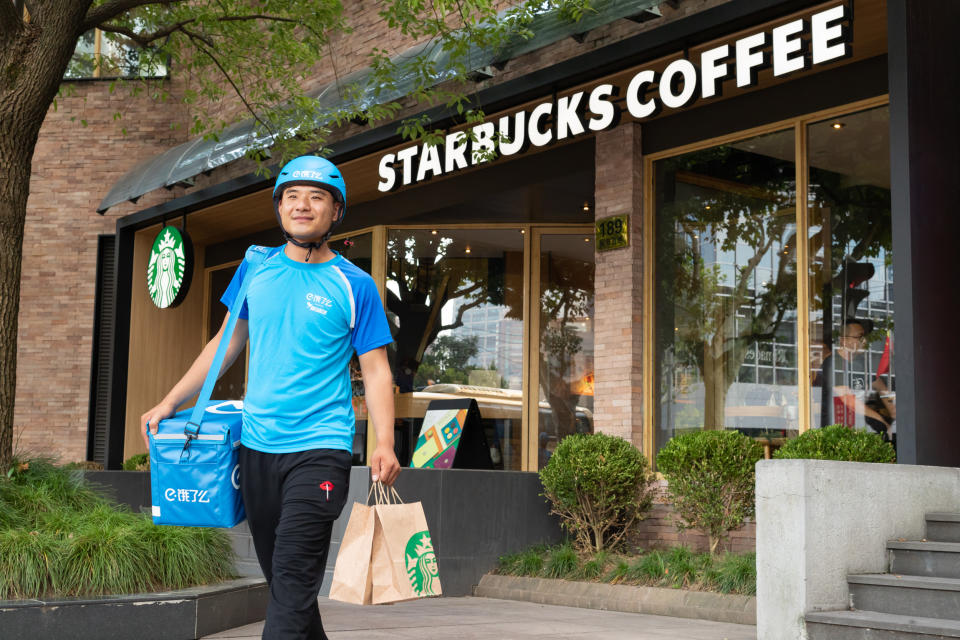Luckin Coffee Might Be Starbucks' Greatest Friend in China
Over the past year or so, Chinese coffee start-up Luckin Coffee has made lots of headlines due to its rapid growth. The chain opened its first store in early 2018, but by the end of the year, it had about 2,000 locations across China. Luckin plans to open another 2,500 stores in 2019, which would make it the largest coffee chain in China, surpassing Starbucks (NASDAQ: SBUX) -- despite the latter's two-decade head start.
Given that Starbucks has made China a centerpiece of its growth strategy, many investors are worried about what Luckin Coffee's rapid rise means for the coffee powerhouse. However, as counterintuitive as it sounds, Luckin's breakneck growth might actually help Starbucks in China rather than hurt it.
China's coffee market is far from its potential
Historically, Starbucks has dominated the coffee business in China. As recently as last year, it held a 58.6% share of the coffee chain market there, far surpassing its U.S. market share.
Nevertheless, Starbucks' revenue in China is just a fraction of what it is in the U.S., even though China's population is four times as large. The main reason is that China is still predominantly a tea-drinking nation. Coffee's popularity is growing, but Starbucks' management has repeatedly acknowledged that it will take many years to get Chinese consumers in the habit of drinking coffee regularly.
In fact, annual coffee consumption in China stood at just 0.4 cups per capita in 2016, according to Euromonitor. In the U.S., the comparable figure was a whopping 750 times higher, at 300 cups per capita annually. Even if coffee never becomes as popular in China as it is in the U.S., it's clear that there is a huge amount of room for the market to grow.

Coffee consumption is still very low in China, compared to the U.S. Image source: Starbucks.
Luckin can accelerate the market's growth
That's where Luckin Coffee comes in. Luckin's focus on delivery and its 100% reliance on digital payments have attracted a lot of attention. However, low prices have been the primary driver of its incredible growth.
Luckin lost well over $100 million last year due to what management calls "subsidies." Aside from having lower menu prices than Starbucks, Luckin has leaned on buy-two-get-one-free and buy-one-gift-one offers to drive growth. The company plans to stick with this strategy for at least the next few years, even though it will mean continued losses. Luckin has already raised hundreds of millions of dollars in venture capital and is planning an IPO for later this year at a valuation of roughly $3 billion, so it can afford to keep losing lots of money to drive growth.
Luckin Coffee's low prices, delivery options, and BOGO-type offers are ideally designed to get more people in the habit of drinking coffee frequently. Rather than just stealing customers from Starbucks, Luckin is likely to drive significantly faster growth in China's coffee market.
This will allow Starbucks to maintain its premium image. Some consumers will always choose Luckin Coffee to save money, but many people who are introduced to coffee by Luckin may patronize Starbucks as well over time, due to its unique focus on offering a "third place" (a social space outside of home and work) in its cafes.
In short, Starbucks can sit back and allow Luckin to incur huge losses to drive growth in Chinese coffee consumption. Five or 10 years down the road, Starbucks could be the big beneficiary as consumers step up to its pricier coffee offerings.
So far, so good
Some investors have pointed to a slowdown in Starbucks' comparable sales growth in China over the past year as evidence that Luckin is taking a toll on the American coffee giant. However, Starbucks' worst sales performance of the past year in China came during the spring (the third quarter of its 2018 fiscal year), when comps fell 2%.
For the past two quarters, Starbucks has returned to comparable sales growth in China, posting two consecutive 1% increases -- despite Luckin continuing to add stores at a frantic pace during that period. Starbucks achieved this result even though its promising delivery partnership with Alibaba only reached scale in December (near the end of last quarter).
Furthermore, the coffee titan's store count in China was up 18% year over year as of the end of last quarter, driving strong double-digit growth in total sales. So far, Luckin Coffee's rapid growth doesn't seem to be hurting Starbucks all that much. And in the long run, the upstart coffee chain's strategy of subsidizing China's retail coffee market could create tens of millions of new coffee drinkers -- who could potentially become customers for Starbucks.
More From The Motley Fool
Adam Levine-Weinberg has no position in any of the stocks mentioned. The Motley Fool owns shares of and recommends Starbucks. The Motley Fool has a disclosure policy.
